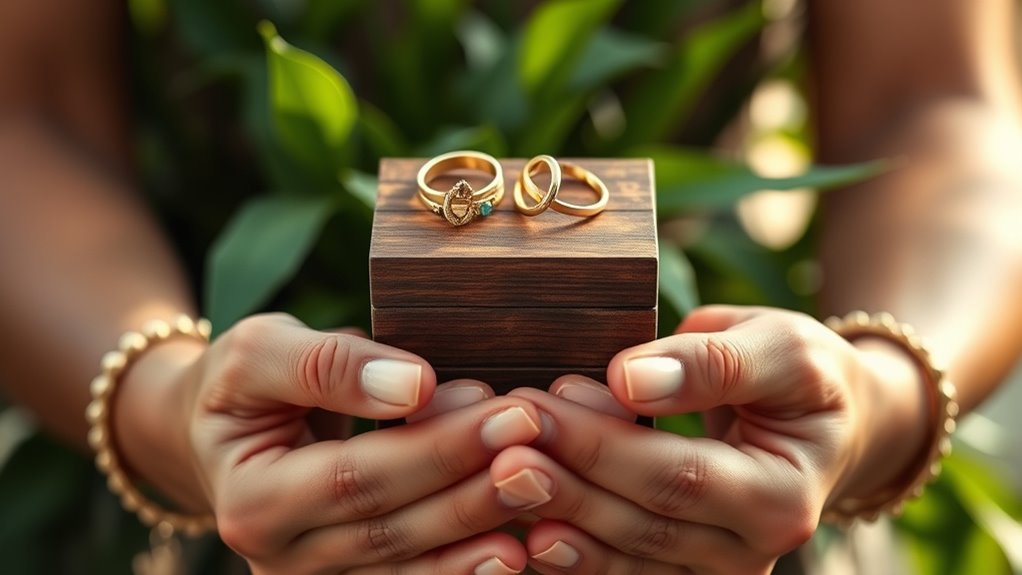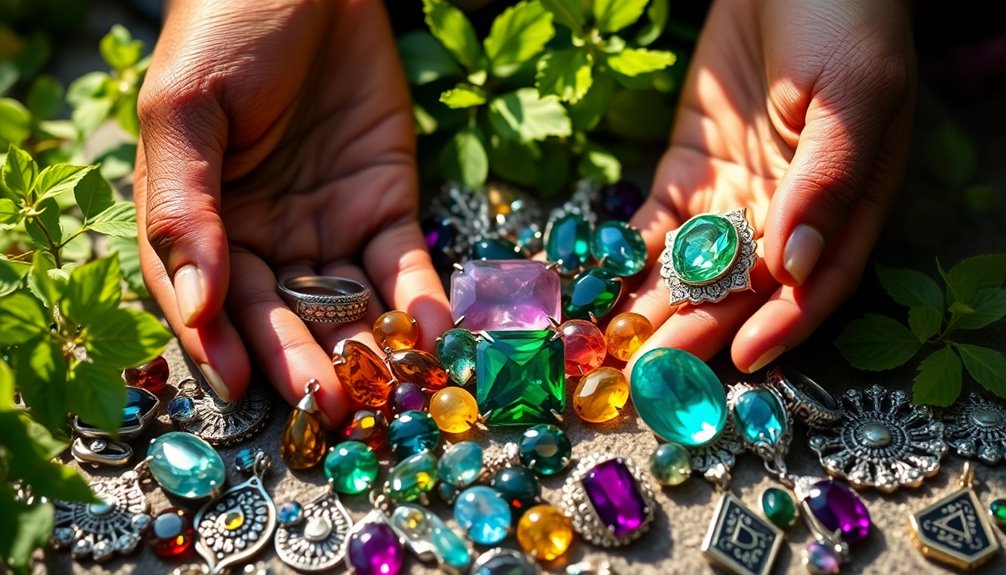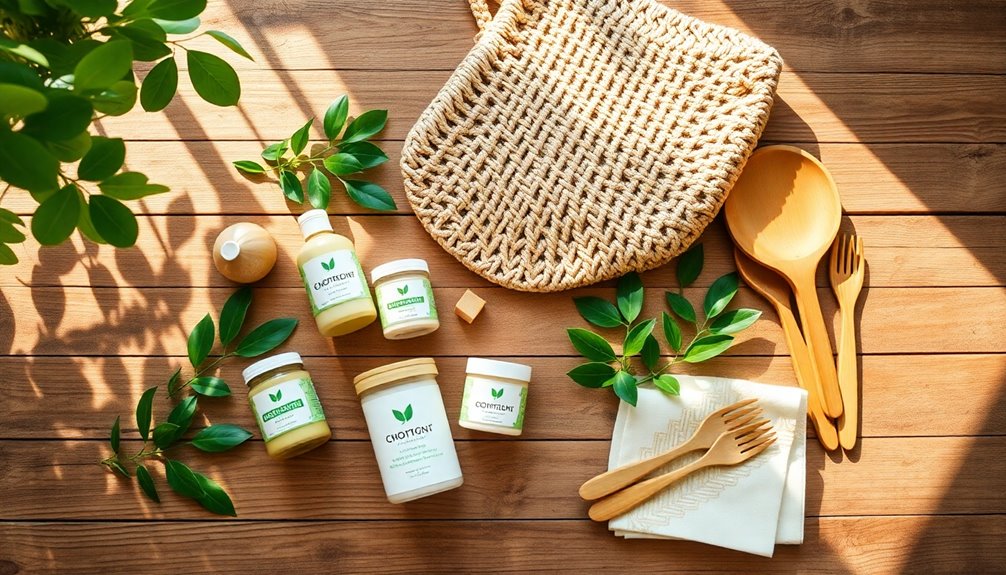If you’re looking for ethical jewelry brands making a difference, check out Ethica Diamonds and Maren Jewellery. They focus on sustainability and responsible sourcing, ensuring their materials are conflict-free and often recycled. Brands like Tiffany & Co. and Carat* London are also leading the charge with transparency in their practices. By choosing these options, you support fair labor and environmental protection. There’s so much more to explore about how these brands create meaningful change.
Key Takeaways
- Ethical jewelry brands like Ethica Diamonds prioritize responsible sourcing and Fairtrade materials, promoting social responsibility in the industry.
- Maren Jewellery focuses on recycled 18K gold and silver, along with lab-grown diamonds, reducing environmental impact.
- Tiffany & Co. is recognized for its strong ethical sourcing policy and commitment to transparency in its supply chain.
- Sustainable practices, such as using recycled metals and eco-friendly packaging, are common among ethical jewelry brands, enhancing their environmental commitment.
- Consumer awareness and purchasing choices drive ethical brands to adopt sustainable practices, fostering a movement towards social justice and environmental protection.

As consumers become more conscious of their choices, ethical jewelry brands are stepping into the spotlight, offering stunning pieces that prioritize sustainability and social responsibility. You might find yourself drawn to brands like Ethica Diamonds, which is celebrated for its Responsible Sourcing Policy and commitment to using Fairtrade materials. Their dedication to ethical practices guarantees that every sparkling piece you wear reflects a commitment to fairness and integrity.
Maren Jewellery takes it a step further by using recycled 18K gold and silver along with lab-grown diamonds. This approach not only reduces the demand for newly mined materials but also supports innovative, eco-friendly solutions. Imagine wearing jewelry that’s not only beautiful but also crafted from materials that help protect the environment.
Maren Jewellery redefines elegance with recycled gold and silver, crafting stunning pieces that champion environmental protection.
Carat* London also shares this vision, focusing on sustainable materials to create ethical jewelry options that align with your values. Tiffany & Co. is another brand that stands out with its strong ethical sourcing policy. They’re often highlighted for their transparency, providing you peace of mind while shopping. Knowing that your purchase contributes to responsible sourcing can elevate your experience.
Similarly, Swarovski is known for its sustainable practices, using lab-grown gemstones that offer a low-impact alternative to traditional mining. Sustainability practices among these brands include using recycled metals, eco-friendly packaging, and guaranteeing fair labor practices. This means when you choose an ethical piece, you’re supporting a broader movement toward reducing carbon footprints and promoting social justice.
Ethical sourcing initiatives like the Kimberley Process and Fairtrade Certification are vital in guaranteeing that your jewelry doesn’t contribute to conflict or exploitation. The impact of ethical jewelry extends beyond individual choices. You’re part of a growing community that values environmental benefits, supports fair labor conditions, and boosts local economies.
Your purchase power is a catalyst for change, encouraging brands to adopt more sustainable practices. With increased consumer awareness, the jewelry industry is shifting towards a more ethical future. However, challenges like greenwashing and supply chain transparency remain. It’s essential to compare brands and make informed decisions.
Frequently Asked Questions
How Can I Verify a Brand’s Ethical Claims?
To verify a brand’s ethical claims, start by checking their transparency.
Investigate their sourcing practices and production methods—look for clear policies on materials and labor. Certifications like RJC, Fairmined, and Fairtrade can provide assurance of ethical standards.
Don’t forget to trace the supply chain; ethical brands often disclose their suppliers.
Finally, engage with the brand through their website or social media to see how they respond to your inquiries.
What Materials Are Considered Sustainable in Jewelry Making?
Imagine a piece of jewelry that sparkles with purpose, each gem telling a story of sustainability.
You’ll find that recycled gold and silver reduce environmental harm, while lab-grown diamonds and ethically sourced gems shine without guilt.
Consider moissanite or cubic zirconia for a stunning, eco-friendly alternative.
Innovative materials like wood and recycled plastic add unique charm, making your choices not just beautiful but also kind to the planet.
What’ll you choose?
Are Ethical Jewelry Brands More Expensive Than Traditional Ones?
Yes, ethical jewelry brands often cost more than traditional ones.
You’ll find that these brands invest in responsible sourcing and fair labor practices, which raises their initial costs. Additionally, high-quality materials and transparent manufacturing processes contribute to the overall pricing.
While you may pay a premium upfront, consider it a long-term investment in durability and quality, often leading to pieces that last and carry emotional significance.
Do Ethical Jewelry Brands Offer Customization Options?
Imagine wrapping your finger in a ring that tells your unique story.
Ethical jewelry brands do offer customization options, allowing you to create pieces that reflect your personality and values. You can choose recycled materials, lab-grown gems, or even create personalized designs that resonate with your life’s journey.
As you explore these options, you’re not just making a choice; you’re crafting a meaningful connection with your jewelry and the planet.
How Can I Support Ethical Jewelry Brands Beyond Purchasing?
You can support ethical jewelry brands beyond purchasing by spreading the word on social media and sharing your positive experiences.
Consider volunteering for community projects they sponsor or donating to organizations that promote ethical practices in mining and labor.
Giving feedback to brands helps them improve, too.
You might even collaborate with them on initiatives that align with your values, fostering a stronger commitment to sustainability and ethical sourcing in the jewelry industry.
Conclusion
In a world where consumers are increasingly conscious of their choices, supporting ethical jewelry brands is more important than ever. Did you know that the ethical jewelry market is projected to grow by 10% annually over the next five years? By choosing brands that prioritize sustainability and fair labor practices, you’re not just enhancing your style—you’re making a positive impact. So, why not wear your values proudly and help drive change in the jewelry industry?










